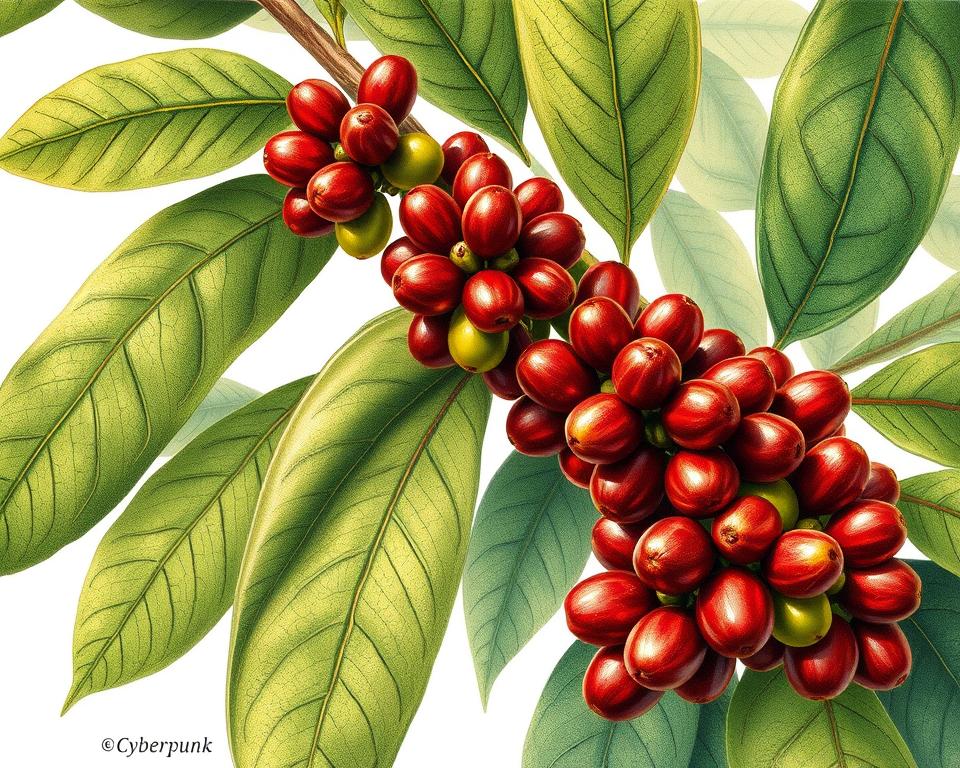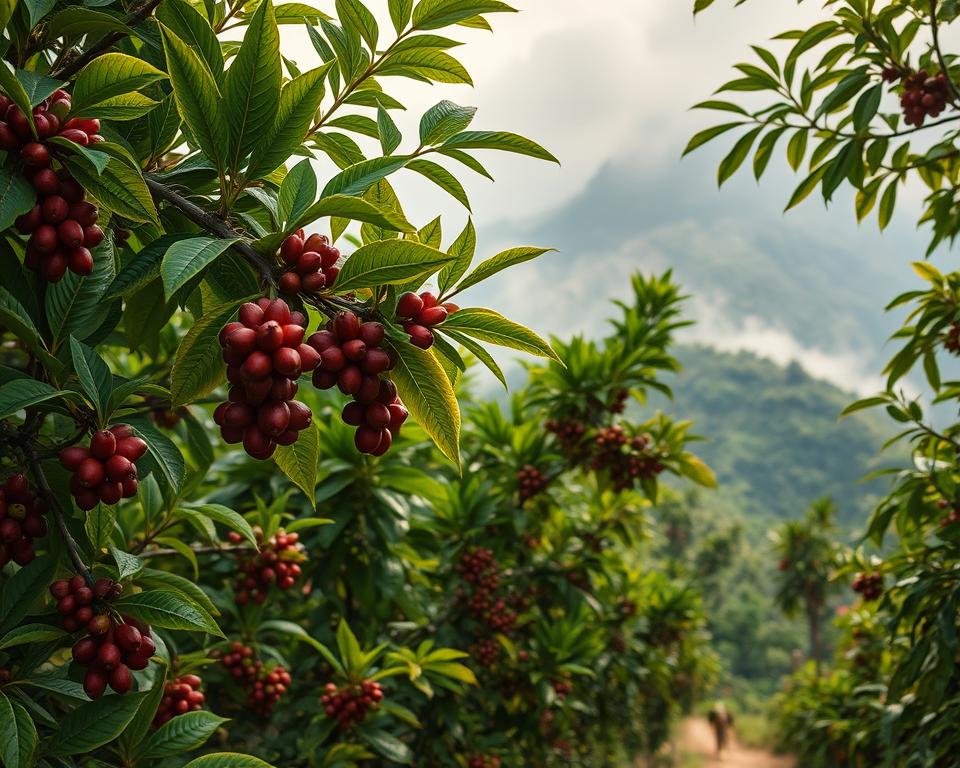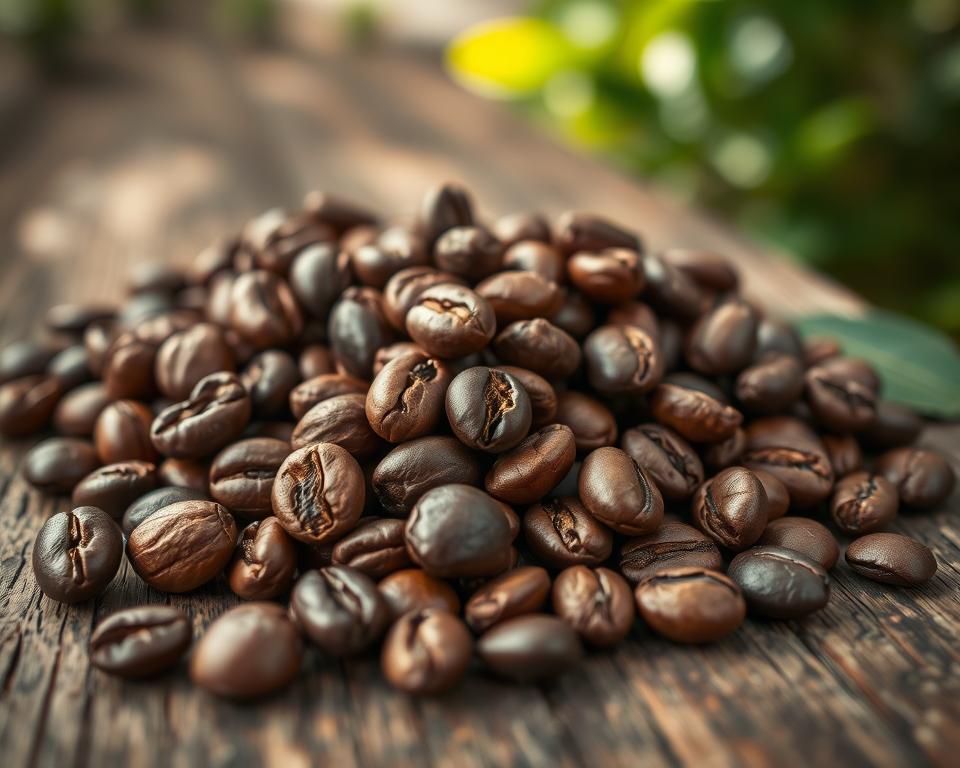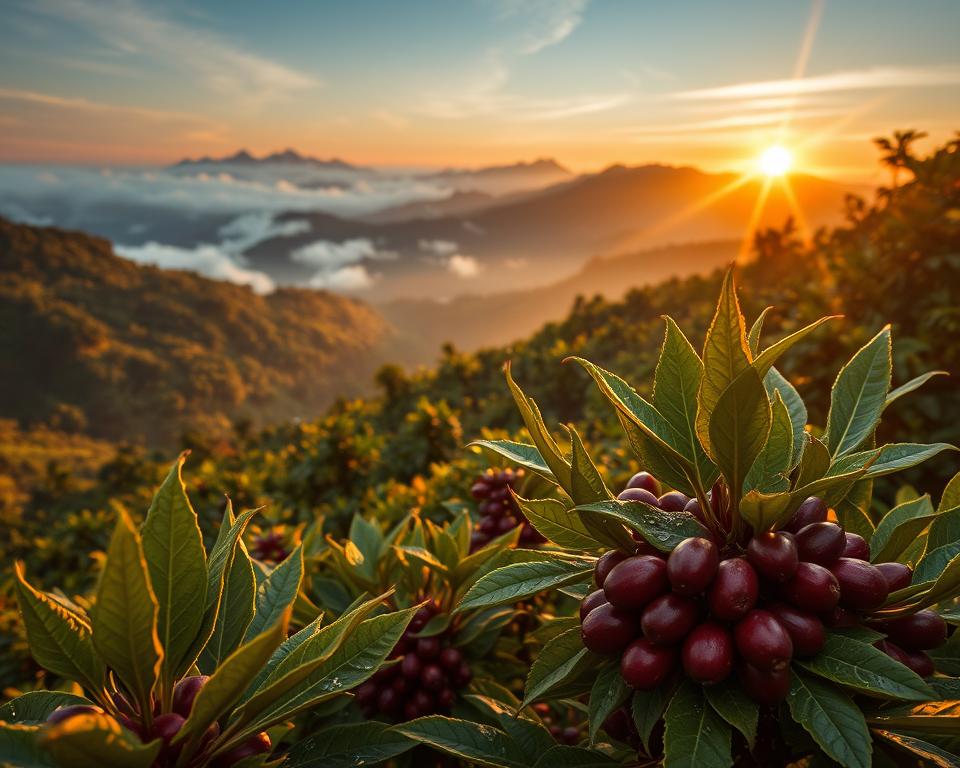Robusta coffee beans are known for being hardy and full of caffeine. They come from the Coffea canephora plant. People love them for their strong taste and unique flavors, often called exotic. Robusta beans are a big deal in the coffee world, making up 40% of the world’s coffee. They’re mainly grown in Vietnam, Brazil, and Indonesia. This type of coffee is special because it has a lot of caffeine and fights off diseases well.
Robusta beans have almost twice as much caffeine as Arabica beans. This makes them taste stronger and a bit more bitter. Their high caffeine level also makes their flavor bolder. This is why they’re great for espresso blends. They offer tastes like chocolate, caramel, nuts, and fruit. That’s why Robusta is so popular for those wanting a rich coffee experience.
Introducing Robusta Coffee: What Sets It Apart?
Robusta coffee, also known as Coffea canephora, is special in the coffee world. Its bold, bitter, and earthy taste makes it unique. This taste is different from the gentler Arabica coffee.
History and Origins
The story of Robusta coffee started in the late 19th century, in the 1890s. It was first found and grown in the Democratic Republic of Congo. This type of coffee is now found in many places around the equator. It is known for surviving tough conditions and having a lot of caffeine, between 1.7% to 4%.
Characteristics of Robusta Beans
Robusta beans thrive at lower heights, from 200 to 800 meters above sea level. They handle heat well and are tough against diseases. This has made them a big part of the coffee world. These beans have about twice the caffeine as Arabica beans. This gives them a stronger bitterness. They also have tastes of earth, chocolate, caramel, and nuts. These flavors can be even more pronounced with certain processing techniques, like fermentation or honey processing.

Comparing Robusta and Arabica
When we compare coffee types, Robusta and Arabica are quite different. Arabica makes up about 70-75% of the coffee made worldwide, while Robusta is about 25-30%. Arabica grows at higher spots, from 1000 to 2000 meters, and likes cooler weather. Robusta grows lower, stands more heat, and costs about 1/3 less than Arabica. Even though Robusta’s smell can be strong or harsh, its low acidity and high caffeine make it great for instant coffee and rich-flavored blends.
Top Robusta Coffee Producing Countries
The coffee world is huge, with certain areas known for robusta coffee. Vietnam, Brazil, and Indonesia lead in production. They bring unique tastes and qualities to coffee lovers worldwide.
Vietnam: The Leading Producer
Vietnam makes nearly 40% of the world’s robusta. This makes it the top producer on the planet. The country’s tropical climate helps grow coffee with bold, nutty flavors and high caffeine.

Brazil: A Significant Contributor
Brazil grows about one-third of all coffee, making a big impact on robusta. Its coffee is smooth and rich, thanks to the warm climate and good rainfall. Brazil also uses different methods to bring out the best flavors.
Indonesia: Richly Diverse Flavors
Indonesia is fourth in coffee production, famous for its variety of robusta. The country’s special way of processing coffee brings out unique flavors. Coffee from areas like Bali, Sulawesi, Sumatra, and Java offer tastes from earthy to sweet.
Vietnam, Brazil, and Indonesia are key players in the robusta market. They range from vast plantations in Vietnam and Brazil to Indonesia’s special beans. For tips to improve your coffee, try this homemade coconut creamer recipe.
Exploring Specialty-Grade Robusta Coffee
Specialty-grade robusta coffee is changing how we see robusta beans. It’s not just bitter anymore. Advanced coffee processing brings out rich, complex flavors. Techniques like honey processing make high-quality robusta taste great.
Growers are using these advanced methods. They focus on farming to make beans score 80 or higher with the Specialty Coffee Association. Better drying and depulping methods improve the beans. This makes the coffee smooth and sweet.
These methods are exciting because they change the robusta’s flavor. Specialty-grade robusta can taste as good as high-quality arabica. It brings new flavors and helps farmers. Small farmers make more money when the demand for quality robusta goes up. To learn more, check out the science behind coffee and heart health.
If you want to try some, consider the Specialty Robusta Tour subscription. It costs $25 to taste some of the best robusta. Places like Paradise Roasters let you order online and ship worldwide. This means you can enjoy great robusta coffee at home.
Are Hybrid Coffee Varieties Related to Robusta Coffee Varieties You Should Try?
Exploring hybrid coffee varieties opens up a fascinating world for coffee aficionados. Understanding hybrid coffee varieties explained clearly reveals their unique traits and flavors, often resulting from the combination of Arabica and Robusta genes. These hybrids can enhance resilience, flavor complexity, and yield, making them a must-try for any coffee lover.
Recommended Robusta Coffee Varieties to Try
If you’re keen to discover the deep flavors of robusta coffee, many varieties are out there. Fans of both single-origin robusta and robusta blends will find options to enjoy. Ready your favorite cup, and let’s dive into the world of robusta coffee.
Single-Origin Robusta Varieties
Single-origin robusta gives a unique taste that highlights each region’s special traits. Take the Ecuador Taza Dorada, for example. It boasts caramel and cacao flavors with a smooth texture. Grown in Central and Western Africa, robusta has a rich history. Now, you can enjoy its bold flavors and high caffeine in its pure form.
Popular Blends Featuring Robusta
Robusta blends are popular for their balanced flavor. Consider trying Espresso Classico. It mixes robusta and arabica for a rich robusta espresso. These blends are known for their intense strength and rich, balanced finish. They’re perfect for espresso enthusiasts globally.
Unique Flavor Profiles
Robusta coffee offers a wide range of flavors, from chocolate and caramel to fruits, nuts, and spices. The origin and how the beans are processed affect the flavors. For instance, Vietnamese robusta has a bold, slightly bitter taste with chocolate and earthy notes. It’s ideal for those who like their coffee with a strong kick. You can learn more about various coffee types at Session Coffee Denver’s website.
Regardless of whether you prefer robusta on its own or in a blend, its distinctive flavors offer an adventurous coffee journey. With robusta accounting for about 40% of the world’s coffee, there are plenty of varieties to explore and savor.
FAQ
What are the key differences between robusta and arabica coffee?
Robusta comes from the Coffea canephora plant. It has a lot of caffeine and is disease-resistant. This makes it different from Arabica beans. Robusta tastes stronger and more bitter. Meanwhile, Arabica beans are usually smoother and have a sweet taste.
Where is robusta coffee grown?
Robusta coffee is found in several places like Central and Western Africa, Vietnam, Brazil, and Indonesia. These areas are perfect for growing robusta. They have the right kind of weather with warm temperatures and are not too high up.
What are some popular blends featuring robusta coffee?
There are special blends that have robusta coffee in them. A famous one is Espresso Classico. It uses the strong taste of robusta to make a balanced drink. It finishes off nicely. These blends are liked for their bold taste and the extra kick of caffeine.
How does the processing method affect the flavor of robusta coffee?
The way robusta coffee is processed can really change its taste. Methods like honey processing and anaerobic fermentation make a big difference. They can make the coffee sweeter, fruitier, and more complex. You might taste chocolate, nuts, fruit, or caramel.
What are single-origin robusta varieties?
Single-origin robusta comes from one place, like a specific farm. This type of coffee has unique flavor notes. For example, the Ecuador Taza Dorada offers flavors from caramel to cacao. It feels creamy when you drink it.
Is specialty-grade robusta coffee available?
Yes, there’s specialty-grade robusta coffee. It’s changing how people think about robusta. When grown and processed with care, this coffee can be rich in flavor. It can be sweet and have a creamy feel. This goes against the idea that robusta is just bitter.
What are the leading countries producing robusta coffee?
Vietnam is at the top when it comes to making robusta coffee. Brazil and Indonesia are important too. Together, these countries make about 70% of all the robusta coffee in the world. Each country’s coffee tastes a bit different. This is because of their climates and how they process the beans.




